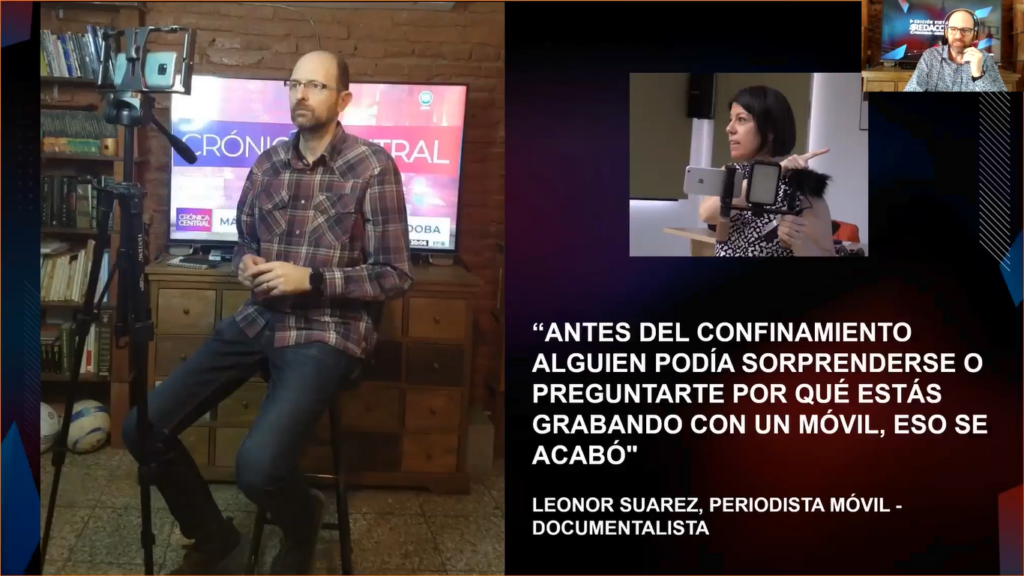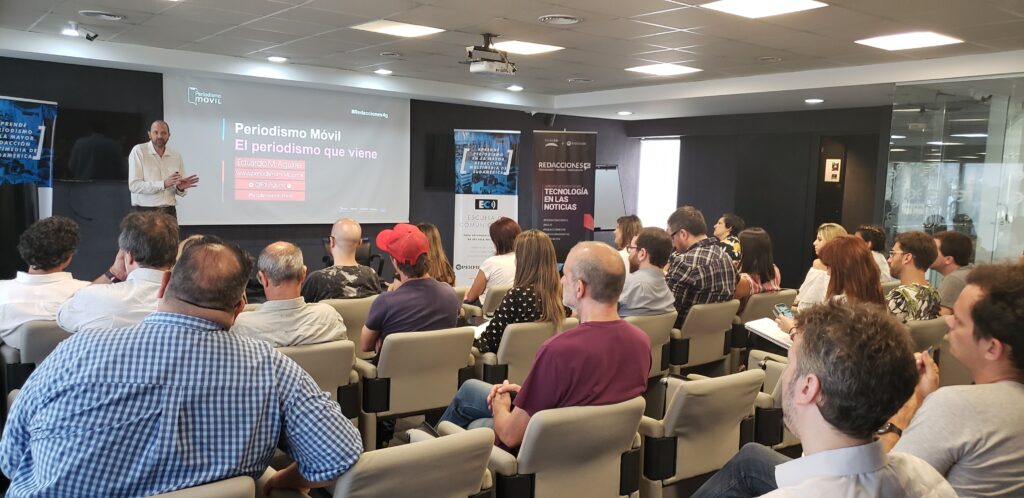The idea that journalists and communications professionals are part of a virtuous circle and can learn from each others’ failures and successes motivates Redacciones4G – Podcast, an initiative launched just over six months ago that was born in Argentina, but now also reaches listeners in Uruguay, Mexico, the U.S. and Spain.

Virtual session of the Program Redacciones4G about mobile journalism. (Courtesy)
"The media kitchen is not something that is talked about much, but it is exactly where the news and the formats are cooked up," Irina Sternik, host and producer of the podcast, told LatAm Journalism Review (LJR). “From the experience of other colleagues, new ideas of methodologies or processes arise and I believe that this is the opportunity. We also learn a lot doing it.”
The episodes also discuss media experiences that were in some way "a failure,” but which imparted great lessons and can serve the entire community of journalists and communicators who follow them, Aguirre said.
"The main mission of our podcast, on innovation and technology, is to bring to our audience the voices of protagonists, from experiences of media from all over the region, and when I speak of experiences I am not only referring to success stories," Eduardo Aguirre, Argentine journalist and podcast producer, told LJR.
The podcast grew out of the pandemic to help promote the journalism training program that carries the same name.
The Redacciones4G Program, an initiative of Telecom Argentina, has already trained (in-person and virtually) more than 150 newsrooms, close to 5,000 journalism and communication professionals, and around 1,000 students of these careers throughout Argentina and other countries from the region, such as Chile and Uruguay, according to the company.
Redacciones4G's training program focuses on innovation in the media and new news formats, with mobile technology as a facilitator of these processes, Pedro López Matheu, director of external communication, sustainability and media at Telecom Argentina, told LJR.
“For this reason, together with expert trainers in digital journalism, we address different topics such as digital transformation, transmedia narratives, new types of audiences, new formats for news and the generation of mobile content, among others,” he said.
The objective of the program, according to López, is to teach journalists, communicators and students of the profession the potential of mobile internet connectivity and new technologies so that digital journalistic media can take advantage of it and develop their newsrooms.

In person workshops of the Program Redacciones4G, before the coronavirus pandemic. (Courtesy)
The program, which began in 2015 when 4G technology arrived in Argentina, was initially based on in-person training workshops for newsrooms, and has evolved at the pace of the dizzying digital transformation that journalism has undergone in recent years.
"Currently, Redacciones4G has training workshops for newsrooms, in-person and virtual, the newsletter [since 2019] and the podcast [in 2020]," López explained.
The podcast, now in its eighth episode, was launched in the middle of quarantine in the current pandemic, in April 2020. It has in-depth interviews with experts in innovation and technology and comes out on the third Monday of each month.
“Little by little, we are getting to know new professionals to interview and we love to travel to their newsrooms in this way through this format. But we also notice that confidence that is generated when listening to a podcast of interest and you wait, like a Netflix series, for the launch of the next episode. That is what we feel with our brand new community that we hope will continue to expand,” Sternik said.
Among the topics covered in the podcast episodes, there are conversations about newsrooms in times of quarantine, fake news and disinformation, podcasts and newsletters in the media, and data journalism.
The podcast, López said, "serves as a meeting point for the voices of global journalistic innovation, within the reach of all journalists who require it."
Among the guests invited by the podcast is Catalan journalist and researcher Ismael Nafría, whose latest book, “The reinvention of The New York Times,” deals with the transformation of the veteran newspaper to the era of mobile journalism. Another guest journalist was Uruguayan Ana Laura Pérez who, among other things, is a fact-checker and digital product manager for El País of Uruguay. Chani Guyot, founder and director of the Argentine media Red/Acción, has also been interviewed on the podcast.
The podcast has more than 500 followers, among the show's overall subscriptions, according to Sternik.
The monthly newsletter the program launched in 2019, like the podcast, has helped build a community of followers and expand its training base. Currently, its newsletter has more than 1,000 subscribers from different areas of Argentina and other Latin American countries, according to López.
"I think that knowing the 'inside' of the newsrooms and how they work in each department or topic is something very valuable for those who are interested in journalism, whether they are journalists or students or simply interested in the subject," Sternik said